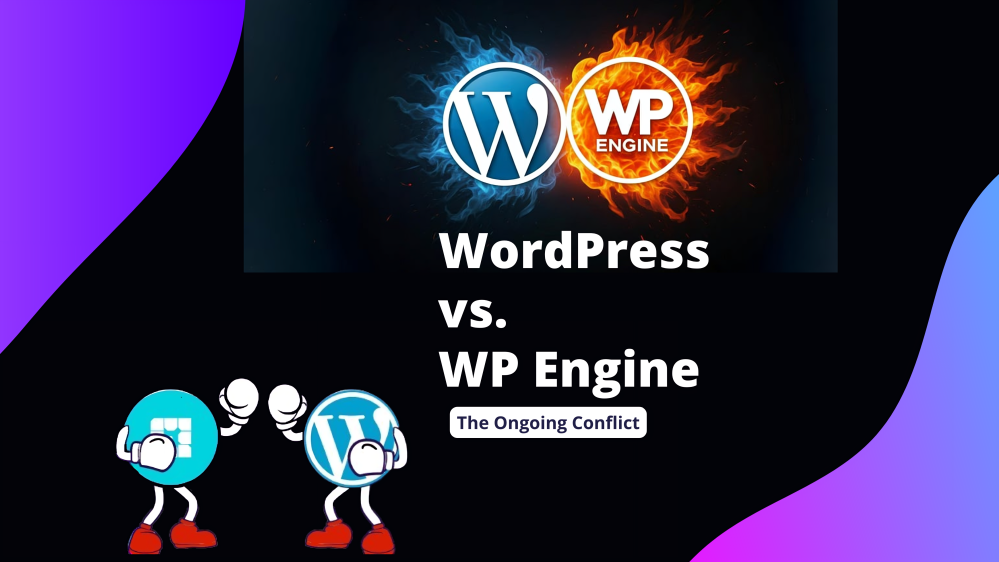
The WordPress ecosystem has been shaken by a high-profile dispute between Automattic, the company behind WordPress.com, and WP Engine, a leading managed WordPress hosting provider. This conflict has led to legal battles, operational shifts, and growing concerns within the community about the future of WordPress.
In September 2024, tensions flared when WordPress co-founder Matt Mullenweg accused WP Engine of misusing WordPress branding and failing to contribute adequately to the open-source project. His comments were strong, even calling WP Engine a “cancer to WordPress.” WP Engine quickly responded with a cease-and-desist letter, accusing Mullenweg of defamation and extortion.
A significant point of contention was a licensing fee dispute. WP Engine claimed that Automattic demanded 8% of its gross revenue for using the WordPress trademark, a claim that intensified the controversy. By October 2024, the disagreement had escalated into legal action, with WP Engine filing a lawsuit against Automattic and Mullenweg. This battle raised critical concerns about WordPress development, governance, transparency, and the balance between its open-source nature and corporate control.
At WordCamp Asia 2025, an awkward Q&A session exposed growing concerns about WordPress’s direction. When asked about where WordPress will be in five years, Matt Mullenweg, co-founder of WordPress, struggled to provide a clear answer. Caught off guard, he turned to Matías Ventura, the Lead Architect of Gutenberg, who also admitted uncertainty.
This raised concerns among developers and users, especially since WordPress is the world’s most popular content management system. The lack of a roadmap beyond Gutenberg’s completion left many wondering about its long-term sustainability.
One of the most significant moments came when an attendee asked Mullenweg about the future of WordPress:
Attendee: “If you have other ideas beyond AI or even how we consume WordPress five years from now that might be different from today?”
Mullenweg hesitated and admitted:
“Yeah, it’s hard to think about anything except AI right now… And for WordPress, at that point, we’ll be past all the phases of Gutenberg. I think… I don’t know…”
Realizing he had no concrete answer, he turned to Matías Ventura:
“Matías, what do you think? What’s post-Gutenberg?”
Ventura responded:
“Hopefully we’ll be done by then so…”
He then elaborated, saying that WordPress would have to adapt as new technologies emerge but avoided providing a clear direction.
Mullenweg added:“Outside of Gutenberg, we haven’t had a roadmap that goes six months or a year, or a couple versions, because the world changes in ways you can’t predict.”
Gutenberg, introduced in 2017, aimed to simplify website building through a block-based editor. However, despite over 85.9 million installations, not all users have embraced it.
At the event, a WordPress developer voiced frustrations about the learning curve, saying:
“Some of those hesitations were it’s easy to get overwhelmed… I had to be really motivated… for myself to actually study it.”
This highlighted a major challenge: if Gutenberg was meant to make WordPress easier, why are new users struggling?
Another key moment was an attendee asking Mullenweg to reconsider Automattic’s decision to reduce its contributions to the WordPress core. This decision could impact future development and innovation.
Meanwhile, Taco Verdonschot, a core contributor, challenged Mullenweg’s stance on adaptability, saying:
“People who were talking about change got banned from the project. How open are you to discussing change in the project?”
Mullenweg responded that discussions about change would not lead to bans, but the situation has fueled debates about transparency and decision-making in the community.
The uncertainty surrounding WordPress’s future, highlighted at WordCamp Asia 2025, was soon overshadowed by the escalating legal conflict between Automattic and WP Engine. The dispute took a serious turn, affecting business operations and raising questions about governance.
This legal decision further deepened concerns about WordPress’s governance, corporate influence, and the future direction of its open-source ecosystem.
As the legal battle continued, its impact spread across the broader WordPress ecosystem. Automattic made a drastic decision in January 2025, significantly reducing its contributions to the WordPress open-source project.
This internal shake-up raised further concerns about the future of WordPress maintenance, as leadership struggles and reduced contributions threatened the platform’s long-term stability.
The WordPress community has been left in a state of concern and uncertainty. With Automattic scaling back its contributions and legal tensions rising, many are questioning the platform’s future.
As WordPress navigates these challenges, its future depends on how the ecosystem adapts and whether the open-source community can maintain the platform’s momentum without relying heavily on Automattic.
Without a clear roadmap and with governance concerns on the rise, many professionals are considering whether they need to diversify their skills or explore alternative platforms.
As of February 2025, the situation remains fluid. Both Automattic and WP Engine continue to assert their positions, while the broader WordPress community watches closely. The hope is for a resolution that preserves the open-source spirit of WordPress while ensuring stability for businesses and WordPress developers who depend on it.